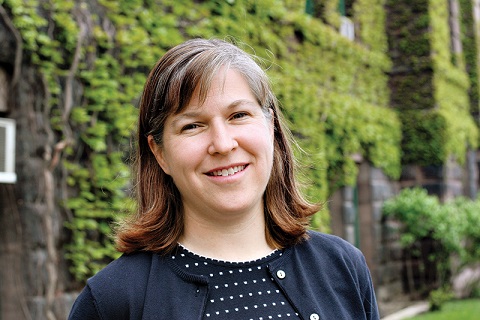You’re an engineering professor. How did you get interested in being a “learning” professor as well? When I started working here in the early ’90s, I was discouraged by the rote learning that was the expectation for many students. I sensed there was more to education than just acquiring knowledge: it was also important to strengthen student mastery in key abilities – teaching them to reason, to work in teams, to write effectively and make credible arguments.
So how can new teaching methods increase mastery? We’re now providing more experiential learning opportunities, where students closely mimic activities they could be doing in the world. We embed students in community projects: urban studies students are helping design new spaces; religion students are working directly with people for social change. Those are just two of many examples.
And in the classroom? Assignments are now sometimes based on real-life problems – so in our first-year design course in engineering, for instance, students recently worked on a project that was fictitious, but based on an actual plan that the City of Toronto had to redesign bicycle parking.
In the 21st century, pen and paper have been slowly but surely replaced by laptops in the classroom. How else is new tech playing a part there? Some classrooms use no technology very effectively, while other courses are fully online. Then we have everything in between. In inverted classes, information transmission is done online so the classroom can become a place for the active, collaborative use of that information.
Does this mean instructors have to become much more digitally adept? It is a different skill set for many. Some instructors are learning how to design their own learning modules – multimedia “book chapters” that include features such as online quizzes or videos. Once these are built, they can be transported from one course to another, leaving the instructor time to interact more directly with their students.
How do we know if newer online teaching methods work better than the old ones? When students are engaged with online materials, we can actually see what they’re doing. We can track how much time they spend watching videos, or how many times they tried a quiz before they got the right answer. We can see what works and what doesn’t, and draw correlations between behaviour and success.
What do we want the ultimate impact on students to be? We used to expect instructors to translate published work into a digestible lecture, then test – in theory – whether students could respond to that content. I think we’ve moved very dramatically away from that, to students practicing their discipline in authentic contexts more frequently, and being assessed in ways that are more authentic to the way their discipline is practiced professionally.
Susan McCahan is U of T’s new vice-provost for innovations in undergraduate education.
How is U of T transforming the undergrad experience? U of T News counts the ways.
Recent Posts
U of T’s 197th Birthday Quiz
Test your knowledge of all things U of T in honour of the university’s 197th anniversary on March 15!
Are Cold Plunges Good for You?
Research suggests they are, in three ways
Work Has Changed. So Have the Qualities of Good Leadership
Rapid shifts in everything from technology to employee expectations are pressuring leaders to constantly adapt






2 Responses to “ Better Ways to Learn ”
Really important initiative. But we must also give students time to pause and think (or not, as they choose!). I believe the action-packed curriculum combined with frequent examination is a progressive disaster that fails absolutely to create the thinkers for the future. Please also unpack the curriculum. Give kids (and yourself) more free time. You may even discover gravity relaxing in you aunt's orchard and watching apples fall from the trees. They say Isaac Newton did!
I agree with David Jenkins. I have a daughter in civ. eng (at Carleton University) and one of the main frustrations is lack of feedback on assignments and tests, and the mechanized nature of testing and online quizzes (multiple choice).
I really valued the feedback I got in my days at U of T (elec. eng.) on long-answer assignments and tests, and I appreciated the personal interactions I had with teaching assistants and professors. Nowadays, these seem to have been replaced with frustrating exercises in figuring out software applications using mysterious sensors connected to a laptop.
Just in case this looks like a nostalgic rant by an old-schooler, we recently hired an MASc grad from U of T, who remarked that one of his pedagogically most effective professors was 86 years old and lectured with chalk -- nothing high-tech -- but was very well-prepared and used real-life examples.
This professor taught me the same way some 35 years ago, and I also was a tutor for his courses. That material stuck in my mind outstandingly well, so I would not dismiss the old ways so fast. That professor is now 87 and going strong.